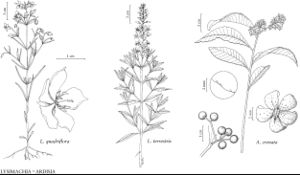Difference between revisions of "Lysimachia quadriflora"
Bot. Mag. 18: plate 660. 1803 ,.
FNA>Volume Importer |
FNA>Volume Importer |
||
| Line 62: | Line 62: | ||
|publication year= | |publication year= | ||
|special status= | |special status= | ||
| − | |source xml=https://jpend@bitbucket.org/aafc-mbb/fna-data-curation.git/src/ | + | |source xml=https://jpend@bitbucket.org/aafc-mbb/fna-data-curation.git/src/f6b125a955440c0872999024f038d74684f65921/coarse_grained_fna_xml/V8/V8_630.xml |
|genus=Lysimachia | |genus=Lysimachia | ||
|species=Lysimachia quadriflora | |species=Lysimachia quadriflora | ||
Revision as of 20:30, 24 September 2019
Stems erect, simple or branched, (1.2–)2–10 dm, glabrous; rhizomes slender; bulblets absent. Leaves opposite; petiole 0.1–0.5(–0.9) cm, ciliate at very base near nodes, cilia 0.1–0.8 mm; blade linear to narrowly lanceolate, 3.4–9 × 0.2–0.6 cm, base cuneate, decurrent, margins entire, revolute, eciliolate, apex acute to obtuse, surfaces not punctate, glabrous; venation single-veined or obscurely pinnate. Inflorescences axillary in distal leaves, solitary flowers (or verticils). Pedicels 0.5–2.8 cm, glabrous. Flowers: sepals 5, calyx not streaked, 3.5–6 mm, glabrous, lobes lanceolate, margins thickened; petals 5, corolla yellow, sparsely streaked with brownish-violet (sometimes obscure) resin canals, rotate, 7–13 mm, lobes with margins entire (sometimes slightly erose distally), glabrous, apex apiculate, stipitate-glandular adaxially; filaments weakly connate at very base, shorter than corolla; staminodes 0.6–0.9 mm. Capsules 3.5–5 mm, not punctate, glabrous (rarely sparsely stipitate-glandular). 2n = 34.
Phenology: Flowering summer.
Habitat: Moist prairies, meadows, roadsides, springs, swamps, bogs, other wetlands
Elevation: 0-600 m
Distribution

Man., Ont., Ala., Ark., D.C., Ga., Ill., Ind., Iowa, Ky., Md., Mich., Minn., Mo., N.Y., N.Dak., Ohio, Okla., Pa., S.Dak., Tenn., Va., W.Va., Wis.
Discussion
Lysimachia quadriflora has been reported as an adventive from Massachusetts (B. A. Sorrie and P. Somers 1999).
Selected References
None.
